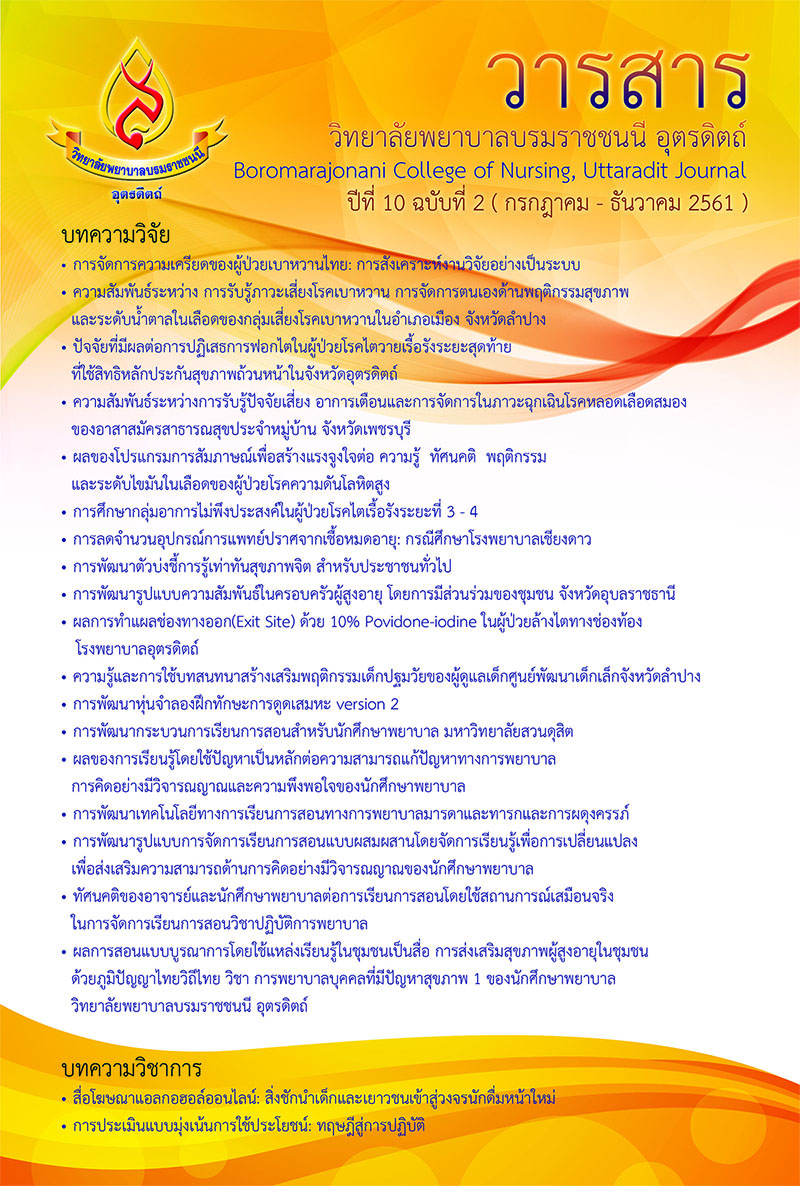ความรู้และการใช้บทสนทนาสร้างเสริมพฤติกรรมเด็กปฐมวัยของผู้ดูแลเด็กศูนย์พัฒนาเด็กเล็กจังหวัดลำปาง
Main Article Content
บทคัดย่อ
การวิจัยครั้งนี้เป็นการวิจัยเชิงพรรณนา เพื่อศึกษาความรู้และการใช้บทสนทนาสร้างเสริมพฤติกรรมเด็กปฐมวัยของผู้ดูแลเด็กศูนย์พัฒนาเด็กเล็กในเขต 13 อำเภอของจังหวัดลำปาง กลุ่มตัวอย่างเป็น ผู้ดูแลเด็ก จำนวน 189 คน เครื่องมือที่ใช้ในการวิจัยเป็นแบบทดสอบความรู้การใช้บทสนทนาสร้างเสริมพฤติกรรมเด็กปฐมวัยของผู้ดูแลเด็ก หาค่าความเที่ยงจากสูตร KR-20 เท่ากับ .615 และแบบสังเกตการใช้บทสนทนาสร้างเสริมพฤติกรรมเด็กปฐมวัยของผู้ดูแลเด็ก หาค่าความเที่ยงจากสูตร Guttman Split-Half ได้เท่ากับ .752 วิเคราะห์ข้อมูลโดยหาค่าเฉลี่ย และ ส่วนเบี่ยงเบนมาตรฐาน ผลการวิจัยพบว่า ความรู้ในการใช้บทสนทนาสร้างเสริมพฤติกรรมเด็กปฐมวัย อยู่ในระดับมาก ( =11.78, SD= 1.42) การใช้บทสนทนาสร้างเสริมพฤติกรรมเด็กปฐมวัย(เชิงบวก) อยู่ในระดับมาก (
=3.43, SD =.42) และ การใช้บทสนทนาสร้างเสริมพฤติกรรมเด็กปฐมวัย (เชิงลบ) อยู่ในระดับปานกลาง (
=2.45, SD =.58)
จากผลการวิจัย ผู้ดูแลเด็กควรตระหนักและให้ความสำคัญในการใช้บทสนทนากับเด็กปฐมวัยโดยมุ่งเน้นในการใช้บทสนทนาเชิงบวกสร้างเสริมพฤติกรรมเด็กปฐมวัยให้มากขึ้น ทั้งนี้จะเห็นว่าบทสนทนาเชิงลบยังมีใช้กันในสังคมไทย ดังนั้นผู้ดูแลเด็กควรเลือกใช้บทสนทนาเชิงลบในสถานการณ์ที่จำเป็นเท่านั้น เพื่อให้พฤติกรรมของเด็กปฐมวัยได้รับปรับเปลี่ยนเป็นพฤติกรรมที่เหมาะสมในอนาคต
Article Details
บทความหรือข้อคิดเห็นใดใดที่ปรากฏในวารสารวิจัยการพยาบาลและวิทยาศาสตร์สุขภาพ เป็นวรรณกรรมของผู้เขียน ซึ่งบรรณาธิการหรือสมาคมศิษย์เก่า ไม่จำเป็นต้องเห็นด้วย และบทความที่ได้รับการตีพิมพ์เผยแพร่ถือเป็นลิขสิทธิ์ของวารสารวิจัยการพยาบาลและวิทยาศาสตร์สุขภาพ
เอกสารอ้างอิง
2. Bayat, M. (2015). Addressing challenging behaviors and mental health issues in early childhood. New York and London: Routledge Taylor & Francis Group.
3. Broidy, L.M, Tremblay, R.E., Brame, B., et al. (2003). Developmental trajectories of childhood disruptive behaviors and adolescent delinquency: A six- site, cross-national study. Developmental Psychology,39 (2), 222-245.
4. Chankan, N.& Meetong, M. (2011). A study of choice management. Nursery service Parents in Hua-Hin Municipality Prachuap Khiri Khan Province. Arts University, Faculty of Management Science. (in Thai)
5. Hansakunachai,T. (2011).Textbook for developmental and behavioral medicine for children. general practice. Bangkok: Developmental and Behavioral Club. (in Thai)
6. Kosai, W. (2011).The development of early childhood language acquisition using whole language instructional model in The early childhood center, Buriram. Information and Technology Resource Center Rajabhat University Chachoengsao. (in Thai)
7. Nichalanon, S. (2012).The instructional package on innovative communication for early childhood development. (Communication innovation for early childhood development). Department of Education
8. Sukhothai Thammathirat Open University Bangkok: Public Company Limited. (In Thai)
9. Pilavas, N. (2018). First language. (online). Retrieved from https://taamkru.com/th/First language. (in Thai)
10. The British Columbia. (2016). Guiding children’s behavior (Originally developed in collaboation with the BC day care action coalition and the early childhood educators of B.C.1996.Revised 2003/02/25, 2016/11/4 ed.): The British Columbia.
11. The Department of Local Government. (2016). Standardization of child development centers. Local administration. Bangkok: Ministry of Education. English translation.(in Thai)
12. Trangkasombat, U. (2011). Make discipline to your children: discipline effectively. (Principlesof Effective Discipline). Bangkok: Santana Printing Co., Ltd. (in Thai)
13. Tremblay, R.E. (2008).Understanding development and prevention of chronic physical aggression: Toward experimental epigenetic studies. Philosophical Transactions of the Royal Society B. 363(1503), 2613-2622.
14. Vichughto, P. (2014). Unit 2: concepts for early childhood behavior, documentation for early childhood behavioral and assessment. Publishern Sukhothai ThammathiratOpen University Nonthaburi. (in Thai)
15. Vongdechakul, S. (2014). Early childhood education unit 5, teaching materials in family education and early childhood development. Nonthaburi: Sukhothai Thammathirat. (in Thai).


